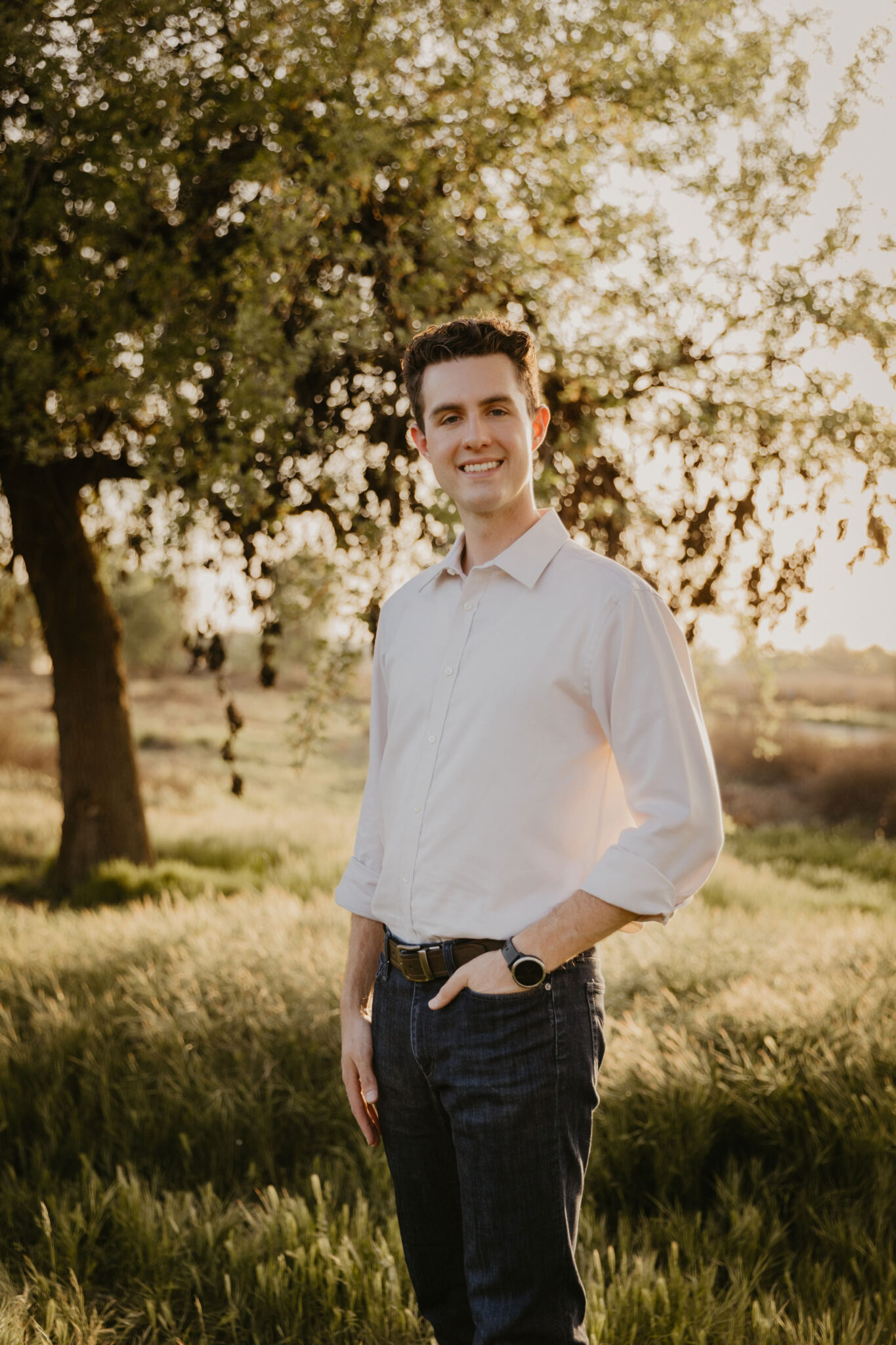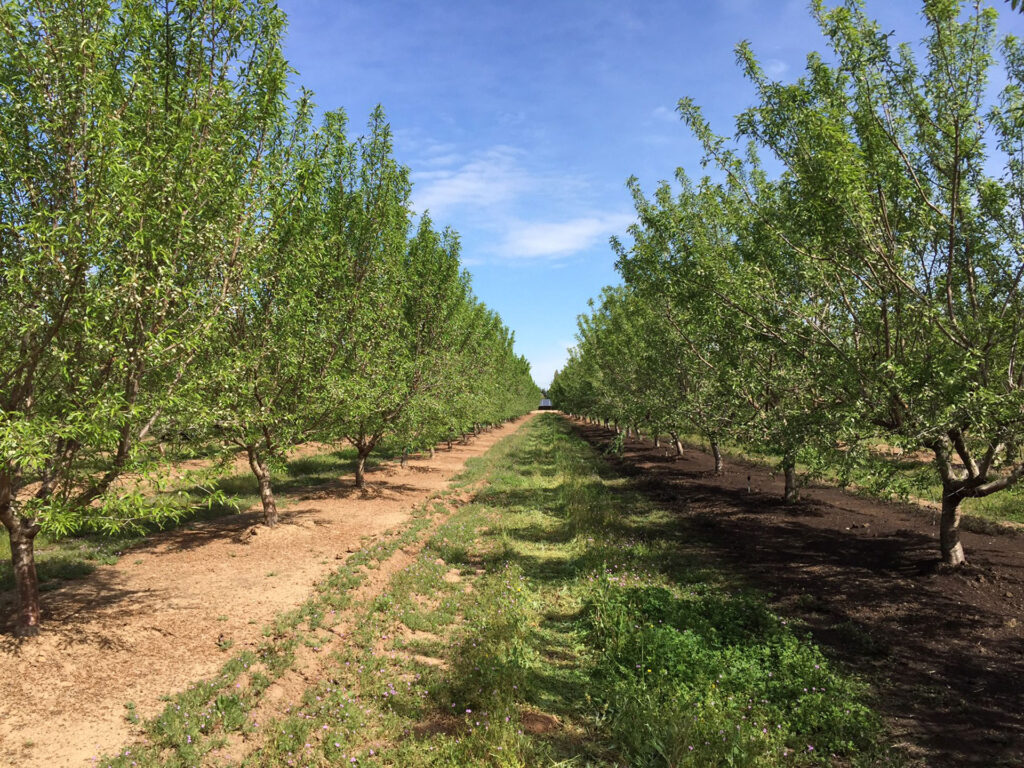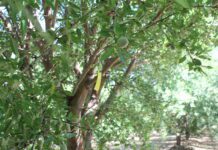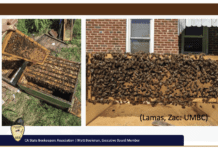
Farming has been practically inescapable for most of Joseph Jackson’s life, and it’s become his livelihood.
Jackson, a part-time grower himself and account manager with Phytech, helped his father grow row crops and stone fruits for much of his childhood in the Kettleman City area. It wasn’t until the early 2000s when his father shifted to farming almonds that he entered the world of tree nuts.
“Like a lot of people in the [Central] Valley, he saw the great prices of almonds and pistachios and thought, ‘Hey, I gotta get in on that as well,’” Jackson said, noting however that it has been increasingly difficult to farm in the area in recent years. “Problems with available surface water or prices of surface water as well as really no access to groundwater at all in our area meant that we kind of kept downsizing the operation, not just in changing crops but also in land sales.”
Looking for the Long-Term
Jackson said he became less engaged in the family farm as it downsized, citing the stress of regulatory challenges as a factor as well as the fact that his current paychecks don’t entirely depend on the weather. That being said, working with growers every day in his position at Phytech has made him miss growing, and he’s been looking to reenter it in a larger capacity.
“I miss [farming] enough to where I don’t think I could go much longer without having any serious impact,” Jackson said. “So, whether that’s buying a small plot, 40, 50 acres, starting there and having a little something, almonds and pistachios especially are what I’m interested in getting back into.
“There are lots of jobs where you go in and feel like you’re clocking in, clocking out and not really seeing anything at the end of the day, and that’s just not the case with farming,” he added. “[In farming], you really do feel like what you’re doing matters.”
Jackson and his father have been in talks to form a partnership and lease or buy a new tree nut orchard. He said that due to current regulations and commercial advancements, he and his father have been more thoughtful throughout the planning process about where the orchard will be located and how it will be managed.
“[We want to] make a system where we can keep farming for a long time,” Jackson said.
Jackson puts great value on optimizing management practices and improving on-farm sustainability, reasons why he said he will never let go of farming. “We’re also helping make positive change, whether it’s caring for a piece of land, taking care of the plants there, the soil there,” he said. “It’s just something really special.”
When considering more sustainable practices, Jackson is also thinking about the next generation of growers. “I have kids now, and with my love of ag, I want them to be able to experience agriculture in the valley,” he said. “So, to do that, we need to be more thoughtful and more sustainable with how we’re farming so that we can keep farming for generations to come.”
Always Contributing
Jackson accrues most of his hours in orchards through his commercial position, but he has also found other ways to stay involved in the tree nut industry. He is a graduate of the Almond Board of California’s (ABC) selective Almond Leadership Program, which “inspires and prepares almond community members to join a network of leaders meeting the challenges of a changing industry,” according to ABC’s website. Additionally, Jackson sits on ABC’s Strategic Ag Innovations Committee where he and other members strategically decide where the almond industry needs to go with things like ag, environmental and food safety initiatives.
At the time that Jackson applied for the Almond Leadership Program, he was still working as a grower full-time and was stuck in what he referred to as an “almond industry silo.” After graduating from the program, he had a clearer understanding of the scope of the industry and could see beyond his grower perspective.
“We have all of these grower concerns on our minds, but when it comes to the almonds, we get them off the tree and kind of pat the trucks goodbye, and that’s kind of in a sense where the almonds stop with us,” Jackson said. “But, they go on a much longer journey, and that’s really what the [Almond] Leadership Program gives you… they actually take you to those places.”
Jackson is referring to every step of the supply chain after almonds are trucked away from the orchards, such as huller-sheller facilities and shipping ports. Program members also get to hear from ABC about industry research into almonds’ nutritional benefits and global marketing efforts.
Members meet for one day every month, and that day is dedicated to an aspect of the industry, Jackson said, whether it’s marketing, transit, research, etc. “[This industry] is all so interconnected, and we really need each other for success,” he said.
Jackson was part of the Almond Leadership Program’s Class of 2019, which consisted of himself and 18 other individuals that contribute every day to the almond industry. On completion of the program, graduates are given an honorary membership to ABC’s multiple working committees, and Jackson took special interest in the Strategic Ag Innovations Committee. Honorary members don’t get to vote on issues, but they are invited to attend meetings, are sent information and resources, and can voice opinions on industry matters at meetings. Jackson applied for a regular membership, which was approved this summer and allows him to be able to have a counted vote, after his honorary membership expired.
The Committee mainly focuses on collecting research that is sifted through by a selection of working groups as well as deciding who gets funding for certain projects. Jackson made it a point to say that this funding, which comes in large part from growers, is by no means going to waste.

“Everyone on this committee is super, super thoughtful about growers’ money,” he said. “Especially with the price of almonds being as low as it is, when part of that [price] is immediately taken off and sent to an agency, you want to feel confident that it’s not just going into a bureaucratic black hole, and it’s really not.”
While Jackson has contributed much of his extracurricular time to almonds through the Almond Leadership Program and the Strategic Ag Innovations Committee, he has also been looking for ways to get more involved with the other major tree nuts. “Working with Phytech in the commercial sector, I also have a lot of walnut growers I work with, pistachio growers. So, I’ve definitely tried to reach out to some of those organizations and find ways that I can participate with the [California] Walnut Board, American Pistachio Growers.”















